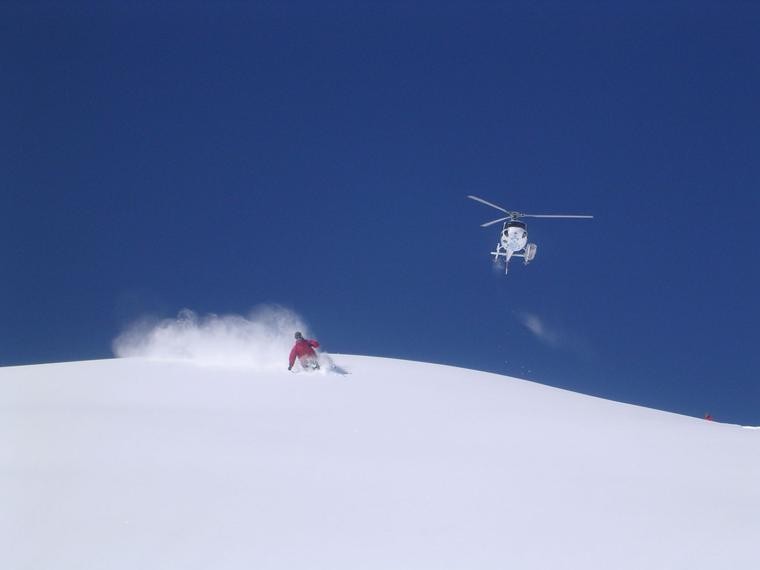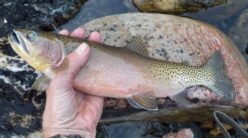The Forest Service has rejected a company’s application to explore heli-skiing in the Centennial Mountains after concerns over impacts on denning grizzly bears and avalanches emerged.
The U.S. Forest Service considered two permits — a temporary special use permit and a research permit — submitted by Rocky Mountain Heli, which was first registered on Dec. 7 in Montana.
A temporary special use permit would have allowed Rocky Mountain Heli to try heli-skiing in the Centennial Mountains for a limited period this winter.
A research permit would have authorized information-gathering on Idaho’s Sawtell and Reas peaks. The company sought to collect weather and snowpack data on different slopes by fixed-wing aircraft and snowmobiles. The research permit would not have authorized heli-skiing.
Elizabeth Davy, Ashland/Island Park district ranger for the Caribou-Targhee National Forest, said Tuesday she is no longer considering Rocky Mountain Heli’s bid to establish a heli-skiing operation on the Idaho side of the Centennial Mountains.
Davy said she decided against issuing either of the permits because she worried about the impacts of heli-skiing on grizzly bears. She also worried about safety risks posed by avalanches.
“I said it’s not worth it for this type of use and for how little use (Rocky Mountain Heli) would have in the Centennial Mountains,” Davy said.
Several public comments on the project acknowledged grizzly bear research that Davy’s team wasn’t aware of, she said. Davy presented the information to the U.S. Fish and Wildlife Service and the agency agreed helicopter activity could harm denning bears.
Andrea Zaccardi, senior attorney for the Center for Biological Diversity, said her organization shared several scientific studies about the impacts of helicopters on denning grizzlies with the Caribou-Targhee National Forest.
The research suggests noise from low-flying or landing helicopters can wake bears from hibernation, Zaccardi said. Grizzlies have been known to abandon their dens or seek shelter elsewhere in the winter, which biologists have said can “cause injury to denning females and possible mortality of cubs.”
“We are happy that the FS recognized the potential threat of heli-skiing in the Centennials and determined that protecting the wildlife there was of most importance,” Zaccardi said.
Davy also said she thought heli-skiing posed a safety risk, as several areas proposed for use were avalanche-prone chutes. Avalanches could threaten other people recreating in the area, she said.
“We’re very pleased that she made that decision,” said Hilary Eisen, policy director for the Winter Wildlands Alliance. “That area is just not an appropriate place for heli-skiing. Between use conflict and wildlife conflict and impacts to nearby wilderness areas and potential wilderness areas, it just didn’t make sense there.”
The Centennial Mountains run east to west along the Montana-Idaho border. The Beaverhead-Deerlodge National Forest and several special designations exist on the Montana side of the range, including a recommended wilderness area and a national wildlife refuge. The designations limit opportunities for recreation.
The Caribou-Targhee National Forest lies on the Idaho side of the range. The area has few special designations and is a popular destination for snowmobilers and skiers.
Davy began working with heli-skiing permit applicants about a year-and-a-half ago, she said. Rocky Mountain Heli first proposed exploring heli-skiing in five zones, but three were abandoned because they overlapped with wolverine denning territories.
Jeremy Henrichon, the registered agent for Rocky Mountain Heli, said the company still wants to pursue heli-skiing in the Centennials but needs to learn more about wolverines and grizzly bears in the range.
“We’re definitely looking at the zones and studying them with our team,” Henrichon said. “We’re also taking feedback from the Forest Service and trying to figure out what zones to go in and stay away from.”
Henrichon said interest in a heli-skiing operation in the Centennials arose in large part because of the COVID-19 pandemic. Access to some popular areas outside of the Lower 48 was restricted amid the pandemic, so Rocky Mountain Heli wanted to expand bookings to the Centennials, he said.
Henrichon’s goal is still to keep bookings open and available to the public, and he wants to offer Bozeman locals a discount.
Rocky Mountain Heli also hopes to increase knowledge about the snowpack and avalanches in the Centennials, Henrichon said. The company’s team has several of the country’s top snow-safety experts and guides, he said.
Henrichon hopes to make information from the company’s avalanche studies and test pits public so all backcountry users can reference them. He also intends to consult with other use groups in the area to “see if there is a way we can make it work for everyone in the area.”



